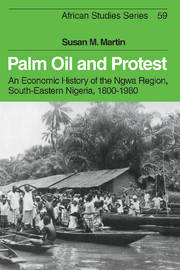Book contents
- Frontmatter
- Contents
- List of maps and figure
- Acknowledgements
- Abbreviations
- 1 Introduction
- 2 Ecology, society and economic change to 1891
- 3 The Ngwa and colonial rule, 1891–1914
- 4 The expansion of the oil palm industry, 1884–1914
- 5 The end of the boom
- 6 Cassava and Christianity
- 7 Authority, justice and property rights
- 8 Trade, credit and mobility
- 9 Production and protest: the Women Riot, 1929
- 10 Cash cropping and economic change, 1930–80
- 11 Conclusion
- Statistical appendix
- Notes
- Interviews conducted in the Ngwa region, 1980–1
- Bibliography
- Index
4 - The expansion of the oil palm industry, 1884–1914
Published online by Cambridge University Press: 11 September 2009
- Frontmatter
- Contents
- List of maps and figure
- Acknowledgements
- Abbreviations
- 1 Introduction
- 2 Ecology, society and economic change to 1891
- 3 The Ngwa and colonial rule, 1891–1914
- 4 The expansion of the oil palm industry, 1884–1914
- 5 The end of the boom
- 6 Cassava and Christianity
- 7 Authority, justice and property rights
- 8 Trade, credit and mobility
- 9 Production and protest: the Women Riot, 1929
- 10 Cash cropping and economic change, 1930–80
- 11 Conclusion
- Statistical appendix
- Notes
- Interviews conducted in the Ngwa region, 1980–1
- Bibliography
- Index
Summary
Eastern Nigeria's export producers began to feel the impact of the late nineteenth-century trade depression in 1885, when London prices for palm oil fell sharply from £30–40 to £20–24 per ton. Liverpool prices fluctuated around the level of £25 per ton throughout the 1890s, recovering only in 1905–6, when a dramatic eight-year boom began. Colonial government policies reinforced the effects of world market trends: the imposition of customs duties coincided with the depression of the 1890s, while the clearing of roads and creeks coincided with the early twentieth-century trade revival.
In this chapter we will examine the impact of successive phases of slump and boom upon the Ngwa and neighbouring farmers. During the depression, eastern Igbo and Ibibio farmers differed from those living to the west of the Niger in maintaining a high output of palm produce, rather than diversifying into large-scale rubber and cocoa production. Then, once the twentieth-century boom began, Ngwa farmers began encountering labour constraints more rapidly than their Ibibio neighbours. These regional differences will be explored below, and related to differences in local soils, climate and population density. The Ngwa-Ibibio contrast will also be related to the special position of the Ibibio as members of the Cross River food-trading network. Within each region, women and men were affected differently by the trade depression of the late nineteenth century. Just before the slump began in earnest, a new export trade had begun in palm kernels, the women's perquisite which previously had had no cash value. William Lever pioneered the industrial use of palm kernel oil in Britain, using it together with coconut oil to make a new ‘self-washing’ soap aimed at working-class consumers in hard-water areas.
- Type
- Chapter
- Information
- Palm Oil and ProtestAn Economic History of the Ngwa Region, South-Eastern Nigeria, 1800–1980, pp. 45 - 55Publisher: Cambridge University PressPrint publication year: 1988



